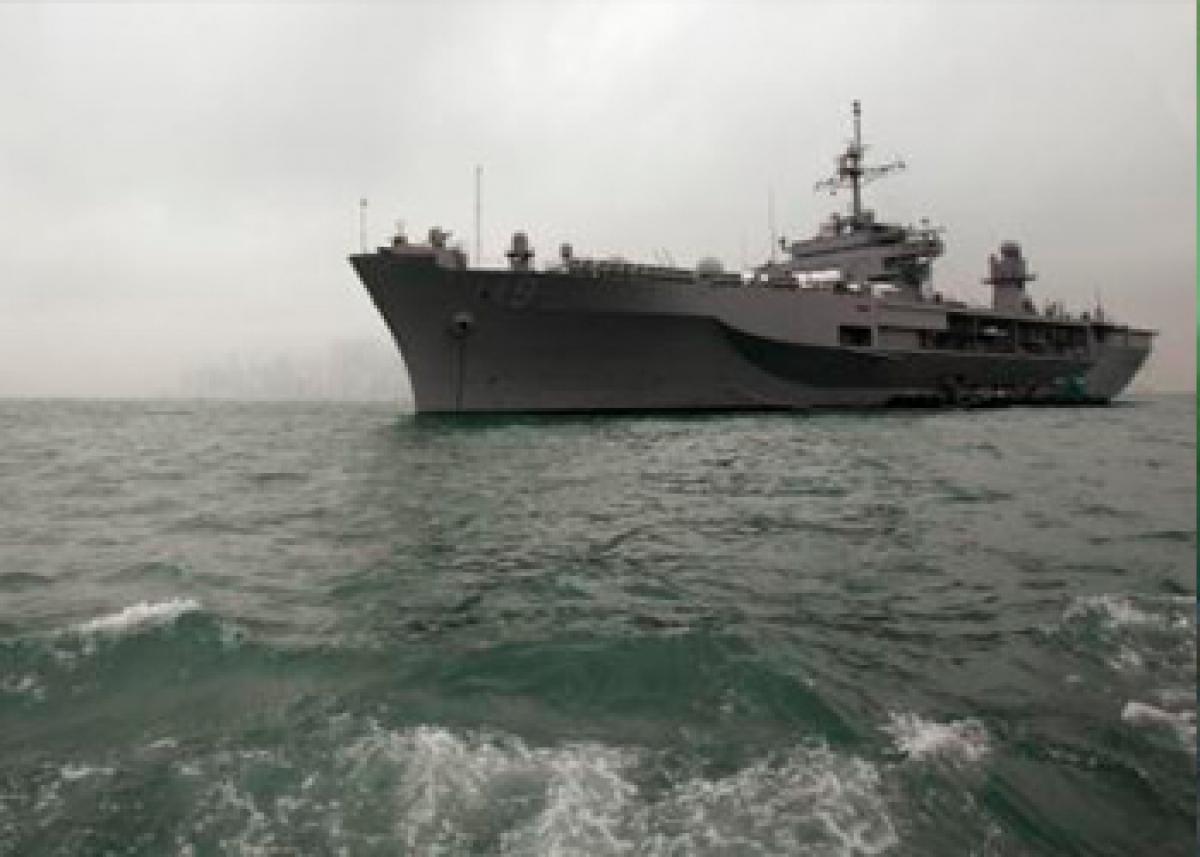Live
- Taluk Guarantee panel
- Uber Launches Uber Moto Women for Safer and Flexible Rides in Bengaluru
- ‘Fear’ pre-release event creates waves
- Champions Trophy 2025 Host Change? Indian Broadcaster's Promo Sparks Controversy
- Nabha Natesh introduced as Sundara Valli from ‘Swayambhu’
- Aamir Khan praises Upendra's ‘UI: The Movie’ ahead of its release
- Celebrations: Keerthy Suresh ties the knot with Antony Thattil
- Indian scientists develop flexible near-infrared devices for wearable sensors
- Wordle Answer and Hints for Today (December 12, 2024) – Solve Wordle #1272
- Kiara blazing through fashion and film
Just In

Krishnapatnam Port, the country\'s largest all-weather; deep water port on the east-coast earmarked a historical moment for India\'s bilateral trade and commerce as the first direct container vessel, part of coastal shipping agreement to facilitate trade between India and Bangladesh, set sail from the port on 28th March 2016.
Hyderabad : Krishnapatnam Port, the country's largest all-weather; deep water port on the east-coast earmarked a historical moment for India's bilateral trade and commerce as the first direct container vessel, part of coastal shipping agreement to facilitate trade between India and Bangladesh, set sail from the port on 28th March 2016.
The trade agreements which were signed during the reign of the then Indian Prime Minister Indira Gandhi in 1974 were revived back after a period of four decades during Prime Minister Narendra Modi's visit to Dhaka last year.
MV Harbour-1 owned by Neepa Paribahan and built by Western Marine Shipyard is the first Bangladesh container vessel to have received the permission from the shipping departments of both the countries.
Commenting on the development, Chinta Sasidhar, Managing Director, Krishnapatnam Port Company Ltd (KPCL) said "This agreement is historic not just for Krishnapatnam but for the entire nation as this would pave way for enhanced bilateral trade ties between the two closest neighbours of the subcontinent. Besides an improved connectivity the service will play a vital role in decongesting the border points and bringing down the cost and transit time involved, thereby providing the best competitive freight rates to the advantage of the industry".
A standard operating procedure was signed between India and Bangladesh last November to move commercial cargo between the two countries also stating the provisions and procedures to be followed for such movement.
To facilitate easy bilateral trade, many conditions have been waived by both countries. The vessels of both the countries upon entry in to India and Bangladesh shall be treated as domestic vessels and not foreign going vessels. The provision will play a key role in addressing the traffic congestion at Petrapole (India) and Benapole (Bangladesh) the two border points which pose as one of the biggest impediments to the movement of EXIM cargo.
This will also offer to reduce the paper work required at the customs check points and port dues paid at Indian ports too will be at par with Indian vessels. The vessel and cargo will also enjoy complete Protection and Indemnity (P&I) coverage insuring cargo from the point of loading to the final destination and till the time the parcel reaches the final consignee.
The crews on both vessels are exempted from aligning to international certifications as they are certified as per the provisions of the two countries stated by the SOP. Both the countries agree to reduce customs documentation and other requirements to the essential minimum for the purpose of easier cargo movement and to have custom stations at or near the points of entry and exit in each country.
"Earlier the shipments from Indian ports being transported to Bangladesh were routed either via Colombo or Singapore. With the launch of the direct service, time taken for such shipments would come down from 2-5 days. We are certain that this will not only build the relationship but also reflect positively on exporters and importers of both the countries, ultimately benefitting the end consumers." said Anil Yendluri, Director and CEO, KPCL.
The opening of this route will also enable the movement of cargo to the North Eastern states of India through coastal shipping up to Chittagong and thereafter by road or inland waterways. Secondly, the deep draft ports on the eastern coast of India can be "hub ports" for the onward transportation of cargo to Bangladesh through River Sea Vessels (RSV).
The SOP stipulates that only two categories of vessels - RSV-IV and RSV-III can ply between the ports. While category IV of the river-sea vessels can sail during all weather conditions and during the night, class III vessels are not navigable only fair weather. These vessels can still through a depth of 3.76 meters and can carry 176 TEUs of cargo at a go.
Ninety two percent of the country's export import trade and draw cargo from western, central and southern India headed to Bangladesh. A lot of cargo can get diverted from road to sea through this initiative and exporters can benefit from rate and transit advantage. A lot of yarn from Ludhiana in Punjab can directly go to Krishnapatnam instead of going to Mundra.
"Shipping to ICT Pangaon via KPCT will provide exporters with a smooth, hassle-free, faster transit and cost efficient shipping service. Exporters and importers from Bengaluru, trading with Bangladesh can utilise and benefit by our weekly train service from ICD Bengaluru to KPCT or road services by trailer/truck" says Vinita Venkatesh, Director, Krishnapatnam Port Container Terminal.
As national carrier shipping corporation of India (SCI)supported KPCT for this call. Some of the customers who booked containers on this voyage are : Kaveri Ginning Mill Pvt Ltd, Manjeet Cotton Pvt Ltd, Wisdom Cotton, M Sherif & Sons, Awatac Container Line Pvt Ltd, Shipping Corporation of India, Pisces Container Lines (I) Pvt Ltd, VVS Global Forwarders Pvt Ltd.

© 2024 Hyderabad Media House Limited/The Hans India. All rights reserved. Powered by hocalwire.com







